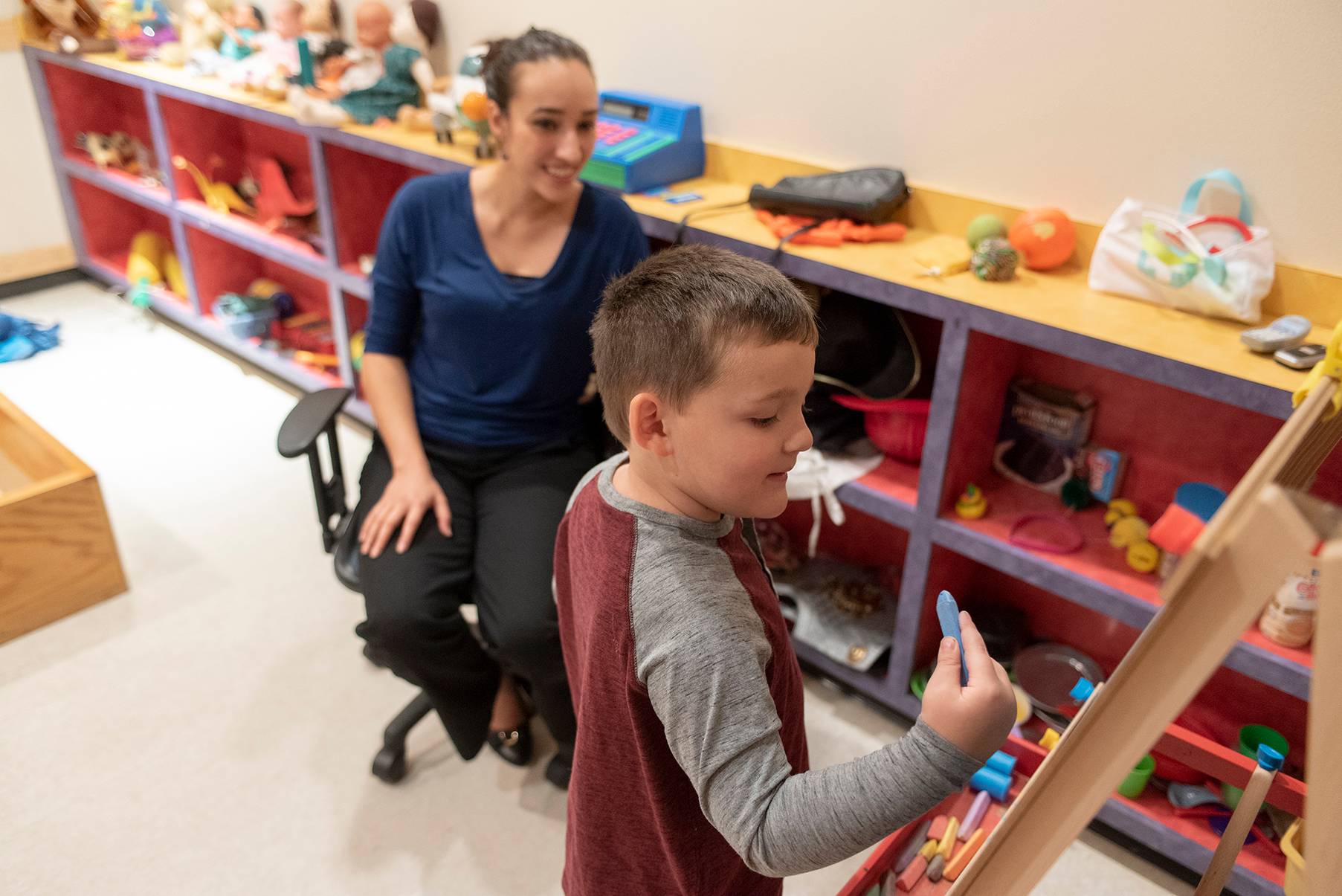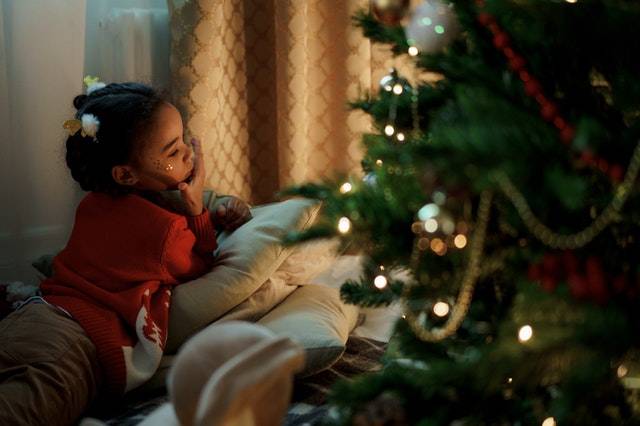Julie Cooper | December 7, 2021

Every year, Dr. Russ Lang says he is asked questions about helping children with autism spectrum disorder (ASD) during the holidays.
The professor of Special Education and executive director of the Texas State University's Clinic for Autism Research Evaluation and Support (CARES) said the No. 1 thing that parents can do is plan ahead.
“Be prepared. We should not assume everybody is happy at Christmas,” Lang said. “Many people feel stress or anxiety at Christmas, and it helps to have a good plan.” He said it is most important to “consider the unique characteristics of the individual child you are trying to support during the holidays. What is it that they are likely to enjoy and what might they find unpleasant?”
And while there is not one specific aspect of a plan that would be universally true for every child with ASD, Lang said parents know their child pretty well.
One way that parents can prepare is to practice. “If you are going to a holiday party try role-playing,” he suggested. If there are going to be games, explain the rules so that they are understood. Discuss key social responses, for example, practice saying Merry Christmas or Happy Hannukah. “Knowing what you are going to say can reduce the anxiety or difficulty with some social interactions.”
Lang agrees that parents can find helpful tips online. He cited websites from Autism Speaks or the Autism Society.
“I don’t think there is anything unusual for preparing for the holidays, compared to preparing for the first day of school, or a big family wedding.” He suggested that parents turn to their child’s service providers – behavior analysts, teachers, special ed providers, or speech-language pathologists, when they had questions.

At CARES, the faculty and staff provide services on campus and in the community. “We teach academics, we reduce challenging or problematic behavior, we teach play skills and language, daily living – which used to be called life skills. We approach it from an educational point of view – as opposed to a biomedical or physiological point of view. We attempt to teach new skills that empower a better quality of life,” said Lang, who joined Texas State in 2009.
The age range for clients is between 2 and 50, though Lang said the average age is between 8 and 12 years old.
Established in 2008 by the College of Education, CARES provides multiple services for individuals with autism and their families, while training school and agency personnel to apply research-based practices. Services include diagnostic assessment and evaluation, clinic and home-based educational programs founded in applied behavior analysis (ABA), social skills groups, job-coaching, functional behavior assessments, behavior intervention planning, consultations, and leisure skills training through the summer camp.
Psychology faculty and students conduct the diagnostics; Special Education faculty and students provide the educational services; Exercise Sports Science faculty with psychology and other students supervise activity in the summer camp.
The clinic, on the ground floor of the College of Education Building, is open daily Monday through Friday. “Graduate students and board-certified behavior analysts provide services, collect data and meet with parents on a regular basis to review progress,” Lang said. While there is a fee for services, the clinic gets some university support and state grants. He said the teaching clinic with graduate students under supervision has excellent outcomes.
“We are really proud of the quality of services we provide. We are focused on evidence-based practice, which is to say what we do is derived directly from peer-reviewed scientific research,” Lang said.
For information about donating to CARES, contact Lang at russlang@txstate.edu; or visit https://cares.education.txstate.edu/support.html
Things to consider for a happy holiday, happy child

Here are some tips for helping a person with Autism Spectrum Disorder (ASD) enjoy the holidays from Dr. Russ Lang, professor and executive director of Texas State University's Clinic for Autism Research Evaluation and Support (CARES).
- Consider the Individual. Individuals with ASD are not all the same. Individuals with ASD have a wide range of skills, opinions, and challenges and no two people with autism are alike. Therefore, consider the unique personality, preferences and dislikes of the child you will spend time with during the holidays.
- Plan and prepare for the changes to the child’s routine schedule. Some children with ASD do not like changes in routines and schedules, visitors in the home, and holiday travel. This may cause anxiety. Discussing changes to the child’s routine before those changes occur may help to reduce anxiety and stress related to the holidays.
Some children with ASD will be able to vocalize their concerns and discuss the upcoming changes. Other individuals may have more limited communication skills and, it may be helpful to look at pictures of previous holidays. For example, pictures of family members that will be visiting, the airport terminal if traveling, and photos of other holiday traditions may help facilitate discussion about the upcoming holiday. - Consider sensitivity to lights, smells, and other forms of sensory input when decorating. For example, flashing lights on a tree, pumpkin spice scents, or the jingling of bells may be aversive to some individuals. On the other hand, some children with ASD may be excited and happy to see decorations that signal the arrival of the holiday season.
Consider allowing the child to help pick decorations and decorate the home. Giving choices and empowering them to make changes to their own environments, may help with the enjoyment of the decorations. Gradually adding decorations over time, as opposed to decorating the whole house all at once, may also help to ease into changes. - Prepare for social interactions. Many children with ASD have trouble with social interactions. However, it is a mistake to assume that difficulty with social interactions means that an individual does not value or enjoy social interactions. It may help to discuss who will be visiting during the holidays, look at pictures of those people, and even identify and practice things the child can say when talking to others (e.g., “Happy Hanukkah or Merry Christmas”).
- Allow a break and provide a place to retreat. It is important to encourage children to be social with friends and family but, some children may do better if those interactions are brief. Consider creating a space in your home for the child to go if they need some time away from the crowd.
- Practice! Practice the activities that the child is expected to participate in before they occur. For example, consider practicing opening small presents, saying thank you, passing presents out to others, watching other children receive toys, and so on.
- Be patient and remember the holidays can be difficult for anyone. Pay attention to your child and be responsive to their concerns when possible. Your idea of the perfect holiday might not be the same as your child’s. Adjusting your own expectations for the holiday may help ensure that everyone enjoys the season.
Share this article
For more information, contact University Communications:Jayme Blaschke, 512-245-2555 Sandy Pantlik, 512-245-2922 |
